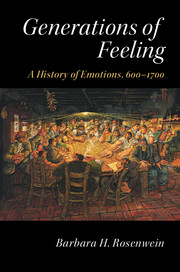Book contents
- Frontmatter
- Dedication
- Epigraph
- Contents
- List of plates
- List of figures
- List of maps and genealogies
- List of tables
- Prefatory note
- Acknowledgments
- List of abbreviations
- Introduction
- 1 Ancient theories
- 2 Attachment and detachment
- 3 Alcuin's therapy
- 4 Love and treachery
- 5 Thomas’ passions
- 6 Theatricality and sobriety
- 7 Gerson's music
- 8 Despair and happiness
- 9 Hobbes’ motions
- Conclusion
- Bibliography
- Index
3 - Alcuin's therapy
Published online by Cambridge University Press: 05 November 2015
- Frontmatter
- Dedication
- Epigraph
- Contents
- List of plates
- List of figures
- List of maps and genealogies
- List of tables
- Prefatory note
- Acknowledgments
- List of abbreviations
- Introduction
- 1 Ancient theories
- 2 Attachment and detachment
- 3 Alcuin's therapy
- 4 Love and treachery
- 5 Thomas’ passions
- 6 Theatricality and sobriety
- 7 Gerson's music
- 8 Despair and happiness
- 9 Hobbes’ motions
- Conclusion
- Bibliography
- Index
Summary
Not long after Leudegar was martyred (c. 678), the Austrasians, led not by a king but rather by a powerful courtier and aristocrat, Pippin II, began to take over Neustria bit by bit. Through wars, astute marriages, patronage of key monasteries, papal support, and key missionaries working on their behalf, the dynasty that would soon be known as the Carolingian gradually assumed power over all of Francia, the ancestor of today's France. Taking their name from Charles Martel (d. 741) (Charles is Carolus in Latin), the Carolingians legitimated their rule with the coronation and anointment of Pippin III (r. 751–68) as king of the Franks. His son Charlemagne (king 768–814; emperor 800–814) forged an empire that included much of today's Western Europe. Wealthy enough to support artists, architects, intellectuals, and poets, and powerful enough to ensure the allegiance of most of the Frankish aristocracy, the support of the papacy, and the adherence of other key groups, Charlemagne presided over a superficially united polity. Key to his success were the powerful laymen whom he enlisted as counts – local governors and judges. Overseeing the counts were chosen laymen and ecclesiastics, the missi [sing.: missus] dominici (literally, “the men sent out by the lord king”).
It was Charlemagne's delight to surround himself with learned courtiers and brilliant advisers. He turned his court into a sort of “school,” though one constantly in flux. But he could not find well-educated teachers in Francia alone. He had to turn to England – where Latin education had accompanied Christianization – and to Italy, where classical traditions had never entirely died out. These regions provided many of the scholars who came to praise, work for, teach, and advise Charlemagne.
Alcuin (c. 740–804) was one of these scholars, and perhaps the most famous. Hailing from a “modest landowning family” in the Kingdom of Northumbria in England, Alcuin spent his boyhood with the community serving York cathedral. It was an archbishopric, and when Alcuin joined it, its archbishop was Egbert (d. 765), brother of Northumbrian King Eadbert (r. 737–58). At York Alcuin learned Latin letters, prayer, and Christian doctrine, and, because of York's close relations with the king, he also learned about politics and powerful men. Throughout his life he contemplated the uses and abuses of rulership.
- Type
- Chapter
- Information
- Generations of FeelingA History of Emotions, 600–1700, pp. 67 - 87Publisher: Cambridge University PressPrint publication year: 2015

